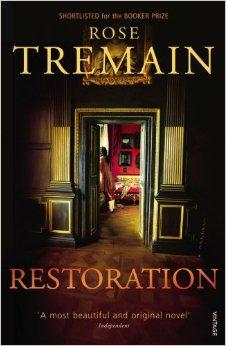
I've had quite a mini splurge on Rose Tremain recently, catching up with those of her novels I hadn't read. I had discovered her to my great delight a couple of decades ago and honestly believed I had read all her major novels including this one. But I hadn't, and now I have. And oh how I did love it.
If you haven't read it -- and if you haven't, you really should -- this story is set in the 1660s. Charles II has returned from exile in France and his influence has changed the whole character of the lives of those who surround him. Gone are the gloomy days of Cromwell's Puritanism, and instead, everyone indulges themselves in every possible way. And that includes the central character and narrator of the novel, Robert Merivel. The son of the King's glovemaker, he has trained as a surgeon but has no employment as the book begins. This is how he asks us to imagine him:
at table, rustling with laughter in a gaudy suit, my migrant hair flattened by a luxurious wig, my freckles powdered, my eyes twinkling in the candlelight, my pudding being ejected from my mouth by that force within me which snorts at sobriety and is so greedy for foolishness. Do not flatter yourself that I am elegant or worthy in any way, but yet I am, at this moment that you glimpse me, a rather popular man. I am also in the middle of a story which might have a variety of endings, some of them not entirely to my liking.
Orphaned fairly recently when both his parents died in a house fire, Merivel rolls through life, drinking, sleeping with anyone he can lay his hands on (though he has a particular preference for women of the lower classes) and buying brightly coloured clothes. He's a good companion, cheerful and friendly, but there are only two people who he has any real feeling for -- two people who could hardly be more different. One is his friend Pearce, a fellow student at Cambridge and a sombre, saintly, thoughtful Quaker. The other is the King, who Merival absolutely idolises. So it is a grand day in his life when Charles asks him to use his medical knowledge to cure one of his beloved spaniels, who appears to be dying. In fact, Merivel does nothing at all for the dog, having got drunk and passed out in the room where he is supposed to be tending to it. But doing nothing proves to be just what was needed, the dog recovers, and soon Merivel is promoted to be the surgeon to the King's dogs. Charles laughs at Merivel, treats him rather as his fool, and before long offers him another position. He has a young mistress, Celia, who needs a husband. If Merivel will oblige, he will get a grand manor house in Norfolk complete with servants and the means to support them, but there's a condition: he is not to lay a hand on the beautiful Celia. Needless to say he agrees, and needless to say after a while everything goes horribly wrong.
Cast out from the manor, Merivel is in despair. But in fact this is the beginning of a journey which will slowly change him from a rather loveable buffoon to a man who takes life, and responsibility, a great deal more seriously. The process starts with a period at an asylum in Whittlesea, where Pearce and some fellow Quakers are tending to a sad group of inmates in various stages and degrees of madness. Though Merivel does some good there, he also steps badly out of line and eventually finds himself once more on the road, homeless and confused about his future. Returning to London, he then lives through the terrible period of the plague and the Great Fire, and emerges from both with some degree of heroism. And he is rewarded. Restoration, in the title, refers not just to the historical era but also to what happens to Merivel at the end.
This novel is remarkable for many reasons. There's so much real joy and exuberence here. Tremain has captured the essence of the period with what seems an astonishing degree of accuracy, whether it is the life of the court, with all its shoddy and amoral grandeur, or London low life, with its teeming streets, boatmen, and laundresses of easy virtue, or the well-meaning attempts of the Quakers to care for the tragic inhabitants of the asylum. But above all this is Merivel's story, one that at times he seems to be telling us while it is actually happening. It really would not be stretching things to call this a bildungsroman -- a handy lit-crit sort of term for a novel about someone growing to maturity, which is often applied to novels like Jane Eyre, where the protagonist starts as a child and grows to adulthood. Because, though Merivel is thirty-seven when Restoration begins, he is remarkably childlike in many ways -- his inability to control his impulses, his lack of any real focus for what to do with his life, his blind adoration of the King. And he does indeed slowly mature and develop through his experiences, learn from his mistakes, and, by the end, it's fair to say that he has become a truly good man.
Restoration was shortlisted for the Booker Prize in 1989, and beaten (most unfairly, in my opinion) by Kazuo Ishiguru's The Remains of the Day, which seems to me a much inferior novel. But that's by the by. There's also a 1995 film, with Robert Downey Junior, which I believe not to be very good at all. Last year Tremain published a sequel, Merivel: A Man of His Time -- I've already got a copy and will be getting to it soon. Highly recommended.
